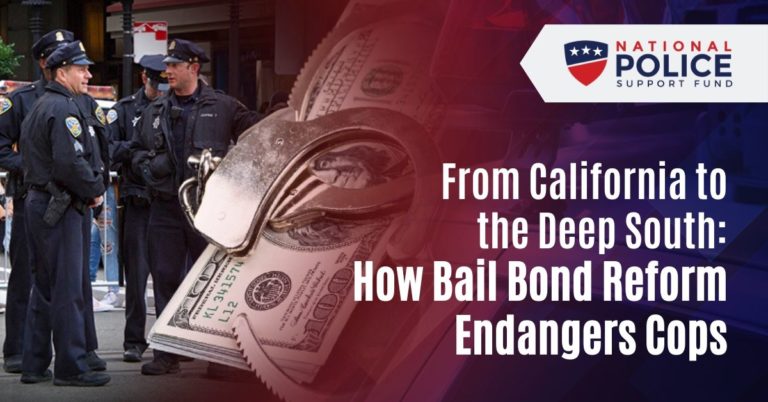Before COVID-19 hit, cities across the country were considering changes to bail bond programs that, in some cases, would make it easier for people convicted of violent crimes to obtain bail and return to the streets.
Putting dangerous, violent criminals back on the streets is not safe and places an undue burden on police officers to make sure they don’t commit another crime while they are out on bail. When the court system fails to act in an appropriate manner and bring justice when it’s due, police are the ones who are left to deal with the consequences — and we already see this happening.
Let’s take a closer look at some of the bail reform measures being taken around the country and why they are putting police in danger.
California
In an effort to address the spread of COVID-19 in prisons, California’s Judicial Council adopted a $0 bail policy for misdemeanors and low-level felonies. The measure was intended to decrease the state’s prison population and stop the spread of the coronavirus, but it’s having some very different consequences for the state’s police officers.
Setting a $0 bail policy signals to criminals that there’s essentially no penalty to them for committing most types of crimes, and some people are taking full advantage of it. Every arrest that’s made means an interaction with at least one police officer, who is put at risk of catching the virus.
In Glendora, California, a man was arrested three times in one day after the change went into effect. Another in Chino Hills was arrested four times in one day, according to the Los Angeles Times. These are just two examples of how the $0 bail policy is playing out on the streets.

The Judicial Council’s decision signals that they value the lives of prison inmates more than the state’s own police officers. That message is coming through loud and clear to the state’s residents, and some are not pleased.
“We hear from people and they’re disappointed that someone can commit a crime and they go to jail, we go through the whole process with them and book them for the crime because there is probable cause to do that, and then because of this order, they’re released,” Cindy Bachman, Public Information Officer for the San Bernardino County Sheriff’s Office told FOX11. “People are disappointed, they’re angry, but this is an order. We have to follow it, but we don’t have to be happy about it.”
LAPD Chief Michel Moore agrees that criminals are exploiting the situation and putting police officers at risk in the process.
“I think repeat offenders need to be off the streets,” Moore said, calling for a reexamination of zero bail for repeat offenders.
Alabama
Earlier this year, Alabama Senator Cam Ward introduced a bill that would bring tougher punishments for violent criminals. The bill came after the tragic deaths of college student Aniah Blanchard and three-year-old Kamille “Cupcake” McKinney.
The suspects charged in both murders allegedly committed the crimes while they were out on bail for other cases. In the case of Blanchard, the man accused of killing her received a $280,000 bond for another attempted murder.
“My bill would just say, if you have one of those Class A Felonies, then you’d have to be held without bond for at least 15 days, and then a public hearing is held, and you can decide whether they should remain in jail or not,” Ward told Alabama Public Radio. “You have to make sure they have an adequate hearing. There has to be due process. You just can’t totally deny bail altogether. But making sure they have that opportunity within 15 days.”
Blanchard’s mother, Angela Harris, has joined the fight to enact the law. She spoke at a news conference in January announcing that the proposed change would be called “Aniah’s Law” if passed.
“I know Aniah is looking down and she’s very proud right now that people are fighting and they’re going to continue to fight for her,” Harris said. “And through this law, she can fight. So, I’m just asking everybody to get on board with this. Help this bill be passed.”
Ward’s bill passed Alabama’s House of Representatives but is currently stalled due to COVID-19. Every day that passes without a change is another day that Alabama’s citizens and its law enforcement officers must work harder to keep cities and towns safe from violent criminals who are released on bail.
While many people in the U.S. are working from home, police officers are on the front lines of keeping their communities safe as COVID-19 continues to spread. Over the past few weeks, more officers have tested positive for the virus, and some have even lost their lives because of it. Read more here.









